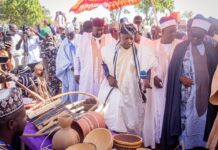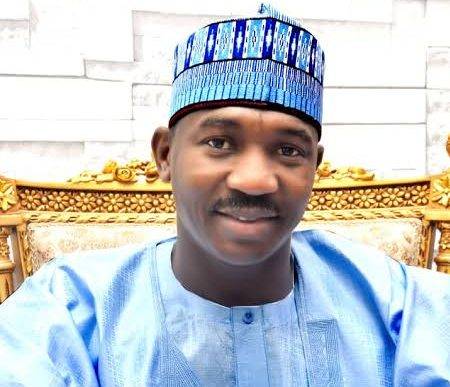It is only natural that the unprecedented victory of Governor Willie Obiano in the November 18 election in Anambra State which saw him win in each of the 21 local government areas in the state by a wide margin would give rise to all kinds of speculations. For instance, it has been reported that Chief Obiano would run in the 2019 presidential election as the candidate of the All Progressives Grand Alliance (APGA). This report is taken seriously in a lot of quarters not just because of the overwhelming victory in the gubernatorial election but also because of his robust record in development.
The speculation, however, is not a true reflection of Obiano’s ambitions. The Anambra State governor does not plan to run, and he has said so categorically. As the Anglican Bishop of … in Anambra State has noted recently, Obiano is not the kind of person who says one thing and does another. His word is his bond. What the governor says is his preoccupation for now is, apart from the rapid development of the state, how to ensure that the current atmosphere of peace, unity and stability in the state is maintained, especially during the 2019 general elections. This state of affairs is necessary because it explains why Nigeria’s freest, fairest and most transparent election ever took place in Anambra State on November 18, 2017.
Governor Obiano does not claim credit for the atmosphere of tranquility in his state alone. He rather shares the credit with, among others, the people of the state and, of course, President Muhammadu Buhari. As Commander in Chief of the Armed Forces, Buhari exercised his power and authority not in a partisan manner but in the interests of justice, peace and fairness. It is well known that many senior members of his party, All Progressives Congress (APC), wanted the Buhari administration to exercise the so-called Federal Might in favour of the APC candidate in the November 18 governorship in Anambra State, but he not only refused stoutly he made sure that the bodies like the Independent National Electoral Commission (INEC), the Nigeria Police Force and the Department of State Security (DSS) as well as the Nigerian Army did their work most professionally. All independent observers submitted reports showing that the election was free, fair and orderly.
President Buhari has since assuming office on May 29, 2015, been behaving like a statesman par excellence. For example, though his APC was keenly interested in winning Bayelsa State during its recent gubernatorial election, Buhari allowed INEC to conduct a free and fair election and announce the result immediately which favoured the Peoples Democratic Party (PDP). Very few political leaders in Africa allow the people’s will to prevail in particularly sub-national elections. Here in Nigeria, we all saw how the then ruling PDP and the National Party of Nigeria (NPN) were winning not only by landslides but also by “moonslides”, as the respected former Chief of Army Staff, Lt Gen. Theophilus Danjuma, once put it humorously.
True, President Buhari did not start what may be called the current electoral revolution in Nigeria by allowing the people’s will to prevail in polls. The credit for the revolution may well begin with former President Goodluck Jonathan who allowed the electoral body to conduct transparent general elections in 2015. Not only was Dr Jonathan defeated, his party’s candidates in the gubernatorial, National Assembly and state legislative races were well defeated. This was the first time a ruling party was trounced at the national level in Nigeria’s history.
It is a good development that President Buhari has been building on this legacy. It is also remarkable that Governor Obiano of Anambra State has pledged to continue to deepen democratic practice in Nigeria by helping the Buhari Administration to ensure that free and fair elections become part of Nigeria’s political culture. Indeed, the governor deserves commendation for working towards making the Nigerian people take free and fair elections for granted, as in the developed world and even in such emerging nations as India, Brazil, South Africa and Indonesia.
Most people expect that the new relationship between Anambra people and Buhari will result in tangible federal presence in the state. The president can order, for instance, the immediate refund of N43bn which Anambra State has expended on federal roads in the state. The president can take the step further by aggressively addressing the tremendous federal infrastructure deficit in the whole of the Southeast.
There is another important point in Governor Obiano’s statement rejecting reports that he is preparing to run for president in 2019, but the point seems lost on most commentators. It is the seriousness with which people should seek the office of the President of the Federal Republic of Nigeria. Though he is eminently qualified to run for the office given his education, experience and accomplishments, Chief Obiano says that he has thus far not prepared himself to run for President but to be a very good governor and APGA leader. This is coming at a time a number of Nigerians take advantage of the easy process of registering political parties and declare themselves presidential candidates. Some use their new position and status to seek huge benefits for themselves and their families at the expense of the Nigerian people.
It is gratifying, therefore, that the ranks of those Steve Covey, one of the greatest management gurus, called principle-centred leaders are growing in Nigerian politics. Obiano, for one, is widely acknowledged as a consistent and high performing governor. Nigeria needs more principle-centred leaders who take doing the right things as an article of faith. As Mahatma Gandhi, the late international statesman of Indian origin, famously stated, politics without principles is one of the deadliest sins of humankind.
It is not by sheer accident that Anambra State has become synonymous in the last few years with development. Whether in employment, education, agriculture, security, infrastructural development or industrialization, its record is impressive. From being the most security-challenged state in the country almost overrun by armed robbers and kidnappers, it has in less than four years become the safest place in the country. Hence, Anambra is now an investment destination. Some $5bn has flown into it in the last three years in form of investments.
Ben Murray-Bruce, the senator representing Bayelsa East, has advised state governments in Nigeria and the Federal Government, too, to understudy how Anambra State has become a model in governance. Kogi State has already taken up the challenge by sending delegations to understudy Anambra State’s special strengths in management of internally generated revenue (IGR). It is regrettable that instead of learning from Anambra State, other states in the Southeast have allowed Kogi State to take the initiative. It is not yet late for the Southeast as well as neighbouring states like Delta to borrow a leaf from Anambra State.
Obiano is an effective leader. It is no magic that he has been returned to office in a way no other governor in Nigeria has. The Nigerian political class has to follow the Obiano example by providing purposeful leadership.
*The Hon Nsofor, former Majority Leader in the Anambra State House of Assembly and Knight of St Christopher in the Anglican Communion, is a member of the Nigerian Society of Engineers.



